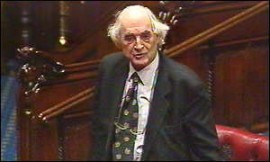
By Conrad Russell
At the moment, when I am asked whether I am working on history or politics, I often find it very difficult to answer. This is because of two issues. One is the relationship between statute and common law, brought to a head by David Blunkett’s persistent attempts to override judicial review as it was by James VI and I’s attempts to do the same thing. Of this some other time. The other is the issue of national sovereignty, unexpectedly brought to a head this week by the revival of the European Constitution, and in March 1603 when James VI, King of the sovereign nation state of Scotland, became also King of the sovereign nation state of England. This was the moment when England lost its national sovereignty, and it has not yet noticed. Working up for press three of last year’s centenary papers, I find all sorts of resonances.
This is especially true of the lecture delivered in Edinburgh, from the pulpit of St Giles’s Church in Edinburgh, in which, having been historian of the one and actor in the other, 1 was able to compare the debate caused by the Union of the Crowns in 1603 with that caused by the revival of the Scottish Parliament, in 1997-9. It is positively alarming to find how little English arguments have moved on in the intervening four centuries, and how far they are identical to the modern arguments of euroscepticism. As it was only the English who advanced these arguments in 17th century Britain, it is only the English who advance them in 21st century Europe. When I say ‘English’ I do not mean British: the Welsh and Scots, because of their relations with the ‘awkward neighbour’, know better.
The characteristics of a sovereign power are, first, that it had no superior save God. This was why Henry VIII thought the Pope offended his sovereignty, and More was a good European. Second, its will was law, and it could not he controlled but by itself. As John Selden said in 1628, the King in Parliament could make it a capital offence to get up before nine in the morning. Third, its law was uniform for the whole of the state. There could be no liberties, exceptions or peculiar jurisdictions, save in so far as the sovereign lawmaker said so. That is one reason why the survival of Scottish law after 1603 meant the end of sovereignty in Britain.
In this creed, the focus of loyalty has to be unique. As an MP said in 1604: “We are English and so cannot be Britons.” That is why for their successors it does not matter what the constitution of Europe says: the mere fact of a constitution means their imaginary pass has been sold.
These are the principles of a very solitary creed. Though they allow treaties to last as long as the sovereign power wishes, outside adjudication on whether the sovereign power is in breach of the treaty is not allowed.
One might say it is the creed of a bachelor nation. In 1996 Lord Wilberforce remarked in a Parliamentary debate that there are now only two major democracies without a written constitution: those of Britain and of Israel. In addition, states largely because of the global character of the economy, are enmeshed in a body of international law put together as treaties under the authority of the UN. The UN Convention of 1951 on refugees is a good example, and one of the many reasons why the Home Office hates it is that it interferes with British sovereignty.
From this point of view, one can perhaps see why the European Constitution which appears to most of us a more or less sensible tidying-up exercise, appears to them a desperate encroachment. It recognises the breach of all three of the principles to which the sovereign-worshipper is wedded. It recognises a power superior to the Queen in Parliament, and so offends the central principles of Henry VIII’s Reformation, which eurosceptics assert surprisingly often. It says there are some things Parliament cannot do. It is not a unitary source of authority: it is part of an argumentative family of authorities.
The eurosceptics say the world has to be like this. It is awkward for them that, as the Scots pointed out in 1604, this argumentative family of authorities is the normal European pattern. In 1603, no other country in Europe enjoyed the sovereignty England was complaining of losing. In 1998 David Steel pointed to plural sources of authority in Germany and Catalonia. Lord Beloff said if David Steel thought this was relevant, he was living in a fantasy world. Isn’t it really the other way round? Isn’t the fantasy world that of the English, who think they’re the only ones here?
Conrad Russell is a noted historian and a Liberal Democrat member of the House of Lords. This article was first published in Liberal Democrat News, 23 April 2004.
